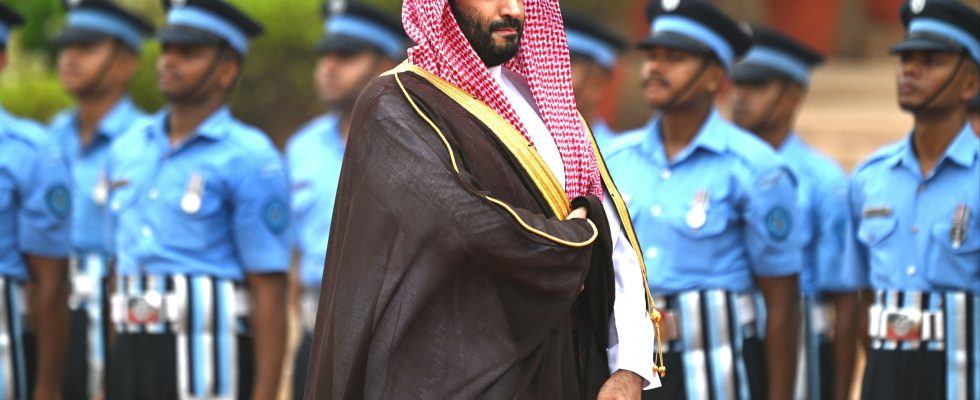October 2018, in Riyadh. Mohammed bin Salman has just celebrated his 33rd birthday. The young Saudi crown prince, already all-powerful, stands on stage in front of a giant screen, flashing the future of his kingdom with a myriad of technological gadgets. In this Gulf TedX, the man who is already known by his initials MBS formulates a promise that raises eyebrows in the assembly and well beyond: “The Middle East will be the new Europe.” Ben Salmane plans to meet in five years, when this region known for its conflicts will have been transformed into a peaceful Eldorado, thanks to his investments and his diplomatic commitment.
Its rapprochement with Israel frozen “at least until the end of the war”
Just five years later, on October 7, 2023, the Middle East fantasized by MBS seemed to disappear in the smoke of a terrorist attack of unprecedented scale: a thousand Hamas fighters crossed the wall of the Gaza Strip to massacre 1,300 Israelis and capture nearly 200. Israel declares war and bombs the Palestinian enclave, killing thousands of civilians. MBS, who admitted on Fox News last month that his country was moving “a little more every day” towards normalization with Israel, finds his back against the wall. “Normalization with Saudi Arabia is completely frozen, at least until the end of the war, recognizes former Israeli officer Yoel Guzansky, specialist in relations with the Gulf at the Institute for National Security Studies. In the long term, MBS can obviously be an ally of Israel.”
For the moment, the Saudi prince places himself resolutely on the Palestinian side. Riyadh refused to condemn Hamas’s actions, preferring to emphasize the “Israeli occupying forces” at the origin of an “explosive situation”. The United States, “disappointed” by the Saudi reaction, is also suffering from MBS’s mood: the latter made Secretary of State Antony Blinken wait all night in Riyadh, even though he was due to speak with him on Saturday evening. The leader of American diplomacy was finally received by the crown prince for breakfast, at 7:30 a.m., with this message: in this war, Saudi Arabia will not be Israel’s ally. At least officially.
But, far from the microphones and the eyes, the situation appears different. Saudi Arabia sees Hamas, this Islamist movement stemming from the Muslim Brotherhood, as a mortal enemy and an obligatory force of Iran. “Hamas is also a problem for the Saudi leaders: they fear it and hope for its destruction by Israel,” says Yoel Guzansky. “The Saudis will never say it publicly but behind the scenes, discreetly, they ask the Israelis to use all their power to crush Hamas.”
Tehran and Riyadh, who waged a war through militias for ten years before burying the hatchet last March, remain the two great adversaries in the region. But the Saudi leaders have no other choice, as guardians of Islam’s holy sites, to defend the Palestinian cause at all costs. “It’s the Persian trap that is closing,” believes David Rigoulet-Roze, associate researcher at the Institute of International and Strategic Relations (IRIS) and specialist in the Middle East. With this operation, they are putting the Arab states which had already normalized their relations with Israel, and especially the one who was in the process of formalizing this rapprochement, in an untenable position. These leaders will have to deal with the pervasiveness of the Palestinian cause, which carries a very strong emotional charge in their respective countries.”
Pro-Palestinian popular pressure to manage
Saudi Arabia, whatever dictatorship it may be, does not escape this pressure from the “Arab street”, which supports the Palestinian cause, going against the normalizations with Israel signed by several governments in recent years. “In the absence of a poll, it is very difficult to measure this feeling in Saudi Arabia,” continues David Rigoulet-Roze. “But, in any case, MBS perceives a risk.” The young prince remains marked by the Arab Spring of 2011, which affected the Gulf and led to a Saudi military intervention in neighboring Bahrain. Also, he knows he was indirectly targeted by the Hamas attack: the terrorist group named its October 7 operation “Al-Aqsa flood”, named after the large mosque built on the Temple Mount in Jerusalem, considered the third holy place of Islam.
However, “it is not certain that the Iranian plan will succeed, estimates David Rigoulet-Roze. Even if they will not be able to say it explicitly, the Arab states concerned, like Saudi Arabia, will undoubtedly be reassured in the need for this normalization: faced with Iran’s destabilizing actions, they are undoubtedly aware that they cannot afford to remain alone and could have an interest in linking up with a credible military power, supposed to have a nuclear bomb . In the Middle East, only one country would have it: Israel.” And, at 38 years old, MBS is used to seeing far.
